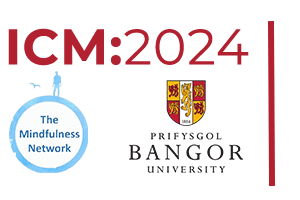Grassroots, real world application, and innovation
How does mindfulness fit into real life?
Our changing world needs new, creative, and context-specific ways to offer mindfulness. In this strand, we’ll share the joys and challenges of developing and teaching mindfulness-based programmes in everyday settings. We’ll learn from innovators working across a range of different environments and discover ways to maintain the integrity and depth of our work whilst embracing new ideas.
Strand 4 includes but is not limited to:
- Innovative approaches to inclusion, equality, and diversity
- Grassroots approaches – innovative implementation
- Innovative approaches to healthcare
- AI and mindfulness
- Intersectionality
- Mindfulness in the workplace
- Therapeutic applications of mindfulness
Strand 4 begins with a Keynote from Amit Bernstein. After this you can choose to attend either: a related panel discussion, workshop, research symposium, or guided practice, which will be held across various spaces in Bangor University’s Pontio Centre
keynote
Helping Refugees Heal, One Moment at a Time: Clinical Science with a Restorative Social Justice Mission with Amit Bernstein
The global human rights crisis of forced displacement has led to a global mental health crisis among tens of millions of refugees and asylum-seekers in communities around the world. The majority of forcibly displaced people and communities are marginalized and minoritized prior to displacement, and often exposed to institutional and communal inequities, discrimination and systemic injustice post-displacement. Likewise, even fast-emerging climate crises, which are creating a new generation of “climate refugees”, have predominantly impacted minoritized and marginalized communities around the world. Yet, despite the magnitude, urgency, and projected growth of this global crisis of social exclusion and injustice, our collective scientific knowledge and capacity to prevent and heal the devastation of forced displacement is years behind the challenge.
Amit says: "I will share my group’s mission over the past decade and our vision for the coming decade, to help build a psychological and contemplative science dedicated to the mental health and restorative social justice of forcibly displaced people. I will describe how we have aimed to include and to empower diverse communities of refugees and asylum-seekers to heal and thrive; through a community-embedded, inter-cultural, community-participatory model to psychological science and social impact, developed with and for forcibly displaced communities. I will focus on findings and theory that led to development and study of a mindfulness- and compassion-based intervention program, that is trauma-sensitive and socio-culturally-adapted, for refugees and asylum-seekers; as well as our efforts to develop, a human-supported digital mobile-health adaptation of the program designed to scale-up its global reach and impact. I will highlight randomized clinical trial findings that point to the transformative potential of mindfulness and compassion training to help refugees cultivate moments of inner refuge and safety, and thereby, initiate a process of recovery and healing; and the struggles to use digital delivery formats to optimize reach and access. I will also share emerging contemplative approaches that we are working on targeting inter-relational and inter-dependent (objective and felt) belonging and compassion post-displacement. Finally, I will also share our vision for the Moments of Refuge Project – a social impact and research initiative dedicated to mental health and restorative social justice among survivors of conflict, collective trauma and forced displacement around the world."
panel
Adapting Mindfulness for High-Stress Healthcare Environments with Clara Strauss (chair), Maura Kenny, Carter Lebares, and Mick Krasner
This panel discussion will feature seasoned healthcare clinical leaders who have pioneered and customised mindfulness-based programmes to address challenges within high-stress healthcare workplaces around the world. They will delve into their experiences of innovating and integrating new mindfulness-based interventions within healthcare organisations that are rooted in their own traditions and cultures. The discussion will centre on developing principles and practical strategies to empower innovation in healthcare and other workplace settings.
Maura will talk about the 6-week Mindful Self Care Course that she has developed, based on the Mindfulness-Based Cognitive Therapy programme. The course facilitates new ways to approach the common challenges that doctors and other healthcare professionals face throughout their careers.
Mick will discuss the development of the Mindful Practice in Medicine program and how it has been applied to changing individual and structural factors that can help health professionals flourish.
Epstein RM, Marshall F, Sanders M, Krasner MS. Effect of an Intensive Mindful Practice Workshop on Patient-Centered Compassionate Care, Clinician Well-Being, Work Engagement, and Teamwork. J Contin Educ Health Prof. 2022 Jan 1;42(1):19-27. doi: 10.1097/CEH.0000000000000379. PMID: 34459443.
Krasner MS, Epstein RM, Beckman H, Suchman AL, Chapman B, Mooney CJ, Quill TE. Association of an educational program in mindful communication with burnout, empathy, and attitudes among primary care physicians. JAMA. 2009 Sep 23;302(12):1284-93. doi: 10.1001/jama.2009.1384. PMID: 19773563.
Carter will discuss the work she has done with colleagues to create an MBI that is streamlined and stripped down to suit time-compressed surgeons and other healthcare professionals (including medical students, ICU nurses, internists and veterinarians). A key part of this is emphasizing ‘informal’ meditation (called “active meditation” by some), but also the language and pacing. Factors that promote participant buy-in and participation, perceived value for the gatekeepers, and long-term sustainability will be explored.
Lebares CC, . Coaston TN, Delucchi KL, Guvva EV, Shen WT, Staffaroni AM, Kramer JH, Epel ES, Hecht FM, Ascher NL, Harris HW, Cole SW (2021).
Enhanced Stress Resilience Training in Surgeons: Iterative Adaptation and Biopsychosocial Effects in 2 Small Randomized Trials. Ann Surg, 1;273(3):424-432. doi: 10.1097/SLA.0000000000004145.
Luton OW, James OP, Mellor K, Lebares CC, et al. (2021). Enhanced stress-resilience training for surgical trainees. BJS Open.5(4):zrab054. doi:10.1093/bjsopen/zrab054
workshop
Mindfulness Innovation Workshop: Lessons from developing the Breathworks HEALS Mindfulness-Based Lifestyle Medicine Programme with Vidyamala Burch.
An interactive workshop looking at the processes of innovation applying mindfulness to broader pillars of well-being.
Vidyamala and Breathworks have spent the last two years developing a new mindfulness programme: Mindfulness-based Lifestyle Medicine (MBLM). This places mindfulness at the heart of behaviour change across broad health domains. They call it the HEALS programme which is an acronym for Health nutrition, Engaging with movement, Awareness, Love and Sleep. This fits into the emerging field of Lifestyle Medicine which aims to empower individuals living with chronic health conditions to feel a sense of agency regarding health behaviours. Breathworks have developed the programme using an iterative ‘Lean Startup’ methodology. Each element of the programme has been tested and iterated with the intended audience, getting their direct feedback as well as using established psychological scales (e.g. for Anxiety, Depression, Quality of Life) to objectively assess the impact the programme is having. This involved developing a prototype programme using a Virtual Learning Environment (VLE) and then engaging with pilot offerings with carefully selected groups such as those who know how to meditate and those who are ’meditation naïve’. The programme has also been piloted in primary care. In this interactive workshop Vidyamala will introduce core elements of the programme as well as workshop the Lean Startup approach offering tips for other innovators in the mindfulness field.
Learning aims:
· To learn how to successfully innovate in the mindfulness field
· To learn how to apply mindfulness to broader health domains
· To learn about Lean Startup methodology
online workshop
Mindfulness-Based Childbirth and Parenting (MBCP): Preparing for Parenthood Mindfully with Jen Moffitt and Eluned Gold.
MBCP: Interrupting Intergenerational Patterns of Suffering, Reducing Health Disparities, Improving Outcomes, Caring for the Carers.
MBCP is a programme for expectant parents preparing the body, mind and heart for parenthood. Based on MBSR, with innovative additions developed by midwife and mindfulness teacher, Nancy Bardacke, (Mindful Birthing), the programme impacts the families of tomorrow, with lower rates of postpartum depression, increased rates of childbirth self-efficacy and improved parent-infant attachment. When parents are healthier and have more resources for "being with" the contractions of labour AND the "contractions of life", that influences the health of the entire family. Stress in pregnancy has been demonstrated to correlate with preeclampsia, preterm birth, low birth weight babies, and adult diseases. Prenatal and postpartum depression can be associated with less-than-optimal mother/infant attachment and long-term negative psychological effects. As we continue to learn more about epigenetics, and the intergenerational nature of trauma, the potential power of mindfulness in the perinatal period offers exciting solutions for the current concerns about perinatal mental health and intergenerational suffering.
In this workshop, we will share aspects of the programme as well as research outcomes and experiences related to the impact of MBCP during pregnancy, childbirth, and throughout the life cycle. We will also be sharing information about our exciting global training programme.
In this presentation, participants will:
1. Hear from MBCP teachers and participants about their experiences with mindfulness in the perinatal period.
2. Learn about the potential impact of stress, including the chronic stress of racism, on perinatal outcomes.
3. Explore the ways in which intergenerational patterns of suffering can be interrupted, with mindfulness training and practice.
References: https://www.mindfulbirthing.org/research
guided practice workshop
Relational Mindfulness: From me to we, a practice for these times with Rosalie Dores.
The primary concern of secular mindfulness has been individual well-being. However, the crises ‘we’ face, socio-political-ecological, go beyond the individual. Indeed, we might describe them as a failure of relationship. For mindfulness to be relevant to the needs of our times, it must incorporate the interpersonal, social and collective. Relational Mindfulness offers a bridge, one that integrates the self awareness and potential insight experienced in individual practice into relationship. In this way, we can cultivate the capacities to relate to each other, the planet and the ‘more-than-human’ through mutual awareness, compassion, wisdom and skill.
This experiential workshop will provide an opportunity to taste the practice of relational mindfulness and explore it’s relevance to these times.
workshop
Coming to Our Senses - Rethinking Mindfulness from the Ground Up with Iwan Brioc.
"Coming to Our Senses" is a groundbreaking eight-week mindfulness program developed by Iwan Brioc, integrating his expertise in applied and experimental theatre with a non-duality informed approach to teaching mindfulness. A recent pilot with NHS staff revealed promising, albeit tentative, signs of its positive impact on mental health, even among participants who attended only half of the sessions.
"For me, the development and teaching of this novel approach has led to a critical reassessment of the foundational principles of how mindfulness is traditionally taught through established models like MBSR and MBCT. It poses important questions: Is there a need to rethink our approach to mindfulness education? In our commitment to a strictly secular methodology, have we potentially "thrown the baby out with the bathwater"?
This workshop offers participants a chance to experience a sample of the new program and engage in a dialogue about these questions and other emerging thoughts. This session invites attendees to explore and perhaps challenge the conventional paradigms of mindfulness training.
Research Presentations
Here are the research sessions for Strand 4.. Each session will feature selected abstracts presented in 15-minute talks, offering a chance to hear the latest cutting-edge research in the mindfulness and compassion fields. Detailed timings will be available in the full conference programme. Full abstracts will be available on the ICM:2024 Community Portal for all registered conference attendees.
Grassroots, Innovation, and Equality
-
Evaluating the Applicability and Perception of Mindfulness Practices within the Beauty Industry in a Small Island State: A Grounded Theory Approach Nadia Cauchi
-
A Tale of Our Time: Mindfulness, the Covid-19 Pandemic, and Trainee Teachers. Natalie Reynolds
-
Turning empathic distress into compassion – A hero’s journey for family carers. Jacqueline Seery
-
Conceptualizing contemplative practices: exploring the impacts of mindfulness in interior design educationn Burçak Altay
-
Mindfulness-Based Stress Reduction Health Insurance Coverage: If, How, and When? An Integrated Knowledge Translation (iKT) Delphi Stakeholder Analysis? Eric Loucks
Mindfulness-Based Compassionate Living (Research group)
-
Recovery from recurrent depression: the effectiveness of mindfulness-based compassionate living for recurrent depression Marloes Huijbers
-
Mechanisms of change of mindfulness-based compassionate living for recurrent depression: examining experiential avoidance, fear of self-compassion, and positive affect as potential mediators of response Imke Hanssen
-
Interplay between Self-Compassion and Affect during Mindfulness-Based Compassionate Living (MBCL) for Recurrent Depression: An Autoregressive Latent Trajectory analysis Marleen ter Avest
-
Changes in self-schemas following Mindfulness-Based Compassionate Living for recurrent depression: a mixed-methods study Vera Scheepbouwer
Mindfulness for Healthcare Staff (Research group)
-
A brief Mindful Self Care course: the Taiwanese experience Jian-Hong Chen
-
A brief Mindful Self Care course for Healthcare Staff: the NHS experience Maura Kenny
-
Mindfulness for Life: Findings and implications from a randomised controlled trial evaluating mindfulness-based cognitive therapy for life training for NHS Staff Clara Strauss
-
The experience of the national UK MBCT in NHS Talking Therapies training programme Robert Marx & Tim Sweeney
Mindfulness for Clinical Populations/Mindfulness and the Digital World
-
Mindfulness based therapy for fatigue management- integrating patient experience with best practice in self-management and MBAs Fiona Mckechnie
-
A mindfulness-based protocol in support of recovery from stroke (MBRFS): A pilot study Lori Gray
-
App vs. MBSR – The Middle Way: Impact of a Hybrid Mindfulness-Based Intervention on Health Professions Students, Faculty and Staff’s Perceived Stress, Self-compassion and Well-being. Sophie Revillard Kaufman
-
Effectiveness of Online Brief Mindfulness-based Cognitive Therapy for the Improvement of Productivity in the Workplace: the Results of a Randomized Controlled Trial Mitsuhiro Sado
Mindfulness and Medicine/Workplace
-
Can we improve resilience to stress in the Drs of tomorrow with Mindfulness Georgina Budd
-
The effectiveness of body scan on improving induced craving by virtual reality in a population of amphetamine use disorders Kun-hua Lee
-
Enhanced Stress Resilience Training Strengthens Neural Substrates and Bio-Behavioral Measures Associated with Skill and Resilience in Surgical and Procedural-Focused Residents: A Prospective Randomized Trial Carter Lebares
-
Enhanced Stress Resilience Training for UK surgical trainees; effect and evolution evaluated Oliver Luton
-
Enhancing Staff Well-being: A Case Study of Peer-to-Peer Mindfulness-Based Programmes at UN Human Rights. Mara Lisa Arizaga



